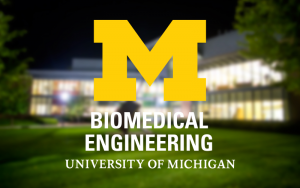Presented By: Biomedical Engineering
BME Master's Thesis Defense - Catherine Long

Engineering an immune-isolating hydrogel for in vitro cancer cell containment to prevent the reintroduction of cancer cells following ovarian tissue autotransplantation
Abstract:
The sterilizing effects of chemotherapy on childhood cancer patients complicate treatment pathways and propagate far into adulthood, yet fertility preservation options exist only for adults. With a specific focus on prepubertal girls, there is only one option to preserve fertility and ovarian endocrine function after cancer treatment: ovarian tissue cryopreservation prior to treatment followed by autotransplantation when the patient is disease free and is ready to undergo puberty or have children. Unfortunately, ovarian tissue in patients with blood borne cancers, such as leukemia, may carry cancer cells and present risks of cancer cell transfer. In response, we have developed a hydrogel-based immune-isolating capsule that protects an allogeneic encapsulated ovarian tissue from immune cells, allows diffusion of nutrients, and promotes tissue survival and function. In this study, we investigated whether the immune-isolating autograft-compatible capsule can prevent cancer cells present with the encapsulated ovarian tissue from escaping the capsule and invading the host tissues, possibly causing cancer relapse. The tested conditions included two levels of encapsulated cancer cells in designs that varied hydrogel shell thickness, core composition strength, and multi-layered construction. These hydrogels were imaged to monitor cancer cell growth and migration through the capsule, and tests for cell viability were conducted to confirm sufficient diffusivity of each design. Additionally, follicle growth expansion with co-encapsulated cancer cells was measured to demonstrate functionality of the device as a suitable environment for tissue survival. By adding an extra layer to the outside of the original hydrogel, the double shelled design was found to be successful in containing cancer cells for up to 34 days without compromising the influx of nutrients necessary for survival. With finding a hydrogel design that successfully retains cancerous cells and facilitates follicle growth, the prospect of utilizing immune-isolating hydrogels as a fertility preservation option for childhood cancer survivors is increasingly promising.
Chair: Ariella Shikanov
Abstract:
The sterilizing effects of chemotherapy on childhood cancer patients complicate treatment pathways and propagate far into adulthood, yet fertility preservation options exist only for adults. With a specific focus on prepubertal girls, there is only one option to preserve fertility and ovarian endocrine function after cancer treatment: ovarian tissue cryopreservation prior to treatment followed by autotransplantation when the patient is disease free and is ready to undergo puberty or have children. Unfortunately, ovarian tissue in patients with blood borne cancers, such as leukemia, may carry cancer cells and present risks of cancer cell transfer. In response, we have developed a hydrogel-based immune-isolating capsule that protects an allogeneic encapsulated ovarian tissue from immune cells, allows diffusion of nutrients, and promotes tissue survival and function. In this study, we investigated whether the immune-isolating autograft-compatible capsule can prevent cancer cells present with the encapsulated ovarian tissue from escaping the capsule and invading the host tissues, possibly causing cancer relapse. The tested conditions included two levels of encapsulated cancer cells in designs that varied hydrogel shell thickness, core composition strength, and multi-layered construction. These hydrogels were imaged to monitor cancer cell growth and migration through the capsule, and tests for cell viability were conducted to confirm sufficient diffusivity of each design. Additionally, follicle growth expansion with co-encapsulated cancer cells was measured to demonstrate functionality of the device as a suitable environment for tissue survival. By adding an extra layer to the outside of the original hydrogel, the double shelled design was found to be successful in containing cancer cells for up to 34 days without compromising the influx of nutrients necessary for survival. With finding a hydrogel design that successfully retains cancerous cells and facilitates follicle growth, the prospect of utilizing immune-isolating hydrogels as a fertility preservation option for childhood cancer survivors is increasingly promising.
Chair: Ariella Shikanov